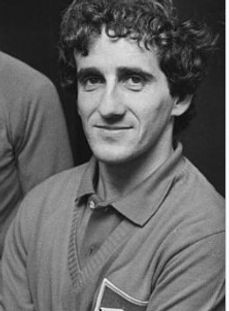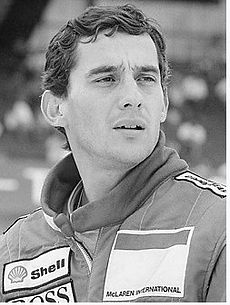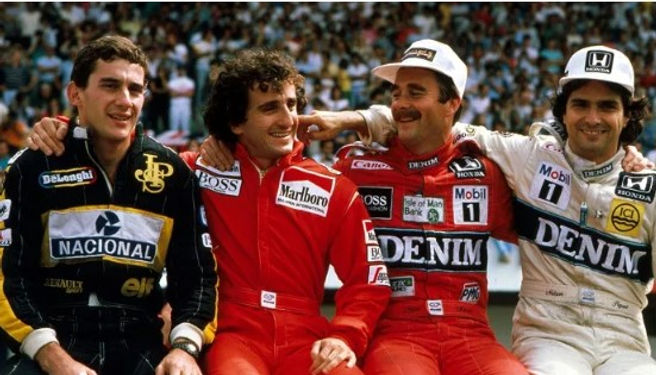ALL ABOUT FORMULA 1

REVIEWS OF ALL SEASONS
LANGUAGE
THE 1980s: FOUR GENIUSES
Many people, including the author of this website, consider the 1980s to be the era with the greatest number of GENIUSES competing against each other in F1. During this period, the following drivers competed: Niki Lauda (towards the end of his career), Nelson Piquet, Alain Prost, and Ayrton Senna, all brilliant drivers who were considered the best in F1, even if only for a short period. Other excellent drivers also competed, such as Keke Rosberg, Nigel Mansell, Alan Jones, Carlos Reutemann, and Gilles Villeneuve, which further enhances the value of this period in F1.
Of course, the 1980s generation wasn't as balanced as the current generation, as there were several untalented drivers racing for smaller teams or even in the second cars of larger teams, such as Ricardo Zunino, Hector Rebaque, Johnny Dumfries, and Satoru Nakajima.
The SUPER LICENSE to race in F1 was created in 1978, but it wasn't until the late 2010s that the criteria for drivers entering F1 became more stringent, to prevent poor drivers from entering the category.
Regardless, the level of drivers in the front row was excellent and beyond. This generation was so strong that good drivers like Patrese, Alboreto, Fabi, Berger, Boutsen, and Nannini had no chance and were overwhelmed by the great talents listed below:
NIKI LAUDA:
Niki Lauda is considered one of the best drivers in F1 history. He easily won the 1975 and 1977 championships. Even after a serious accident at the Nürburgring in 1976, he recovered and continued to drive at a high level, easily defeating all the excellent drivers of the late 1970s.
But in 1979 at Brabham, things began to change... he began taking time away from his teammate, a young Brazilian named Nelson Piquet, who would become a three-time world champion. Niki decided to retire from F1 for the first time.
In 1982, Ron Dennis convinced the Austrian to return to F1, but he struggled with the turbo engines and the competition from the drivers of that period. Lauda lost two seasons (1982 and 1983) to John Watson at McLaren.
In 1984, Niki had the brilliant Alain Prost as his teammate and defeated the Frenchman by just 0.5 points. It should be noted that luck was very favorable that year, as Prost suffered setbacks in races with potential for victory (USA II, Ing, and Ita), and the Frenchman even had his points from the 1984 Monaco GP cut in half. These lost points gave the title to Niki Lauda, who had raced behind Alain Prost in most of the races.
In 1985, Prost relentlessly beat Lauda, and the Austrian retired from F1 for good at the end of the year. Lauda's extreme difficulties in the 1980s demonstrate the power of this new generation. Nelson Piquet and Alain Prost, teammates who defeated Lauda, went on to win seven world titles.
Niki Lauda: He was nicknamed "The Computer" for being a fast and calculating driver.
Champion 1975, 1977, and 1984
Runner-up 1976
Pole positions: 24
Victories: 25
Podiums: 52
In the opinion of the author of this website, Niki Lauda is in the TOP 10 of F1 history.
NELSON PIQUET:
The Brazilian is considered the most complete driver in F1 history, due to his mechanical knowledge and all the innovations he brought to F1, such as in-car brake distribution adjustment and tire heating, which he recommended to Gordon Murray. The South African engineer created a gas cabinet to warm tires before pit stops (See the topic on F1's GREATEST DEVELOPMENTS).
The Brazilian beat all his teammates in the overall season standings, with the exception of Niki Lauda in 1979. However, it should be remembered that Piquet was a rookie and Lauda was already experienced. Furthermore, Piquet was responsible for Niki Lauda's first retirement in 1979, when he began outpacing the Austrian in practice.
The Brazilian was undoubtedly the best driver of the first half of the 1980s, winning two titles without a dominant car in 1981 and 1983, always winning in the last race of the year.
Nelson Piquet: He was a complete, fast driver and a car developer; he was the "Mechanical Genius."
Champion 1981, 1983, and 1987
Runner-up 1980
Pole positions: 24
Victories: 23
Podiums: 60
In the opinion of the author of this website, Piquet is in the TOP 10 in the history of F1.
ALAIN PROST:
If Piquet was the best driver of the early 1980s, Prost was arguably the best driver of the second half of the 1980s. The Frenchman won the championship in 1986 with an inferior car and defeated five world champions (or future champions) within their teams: Lauda in 1985, Rosberg in 1986, Senna in 1989, Mansell in 1990, and Hill in 1993.
No one has ever done that in F1.
Prost defeated all (absolutely all!) of his teammates in overall season points. It's worth remembering that he was the only driver to beat Ayrton Senna within the team and was responsible for Niki Lauda's permanent retirement.
Alain Prost: "The Professor" was a super fast, equipment-friendly, and very consistent driver.
Champion 85, 86, 89, and 93
Runner-up 83, 84, 88, 90
Pole positions: 33
Wins: 51
Podiums: 106
In the opinion of the author of this website, Prost is in the TOP 5 in F1 history.
AYRTON SENNA:
Senna is considered the fastest driver in practice, on street circuits, and in the rain. He possessed above-average natural talent, capable of getting everything out of any car, and possessed great technical ability. Who doesn't remember that Senna won the 1984 Race of Champions in the Mercedes 190 E, competing against several F1 champions? Note: Senna had never raced a touring car in his entire life...
Senna won the 1990 and 1991 titles without having the dominant car. In 1990, McLaren was evenly matched against the Ferrari of Prost and Mansell, and in 1991, McLaren was slightly behind the Williams of Mansell and Patrese.
Ayrton Senna: He was a driver who stood out for his "pure speed" and natural talent.
Champion 88, 90, and 91
Runner-up 89 and 93
Pole positions: 65
Wins: 41
Podiums: 80
In the opinion of the author of this website, Senna is in the TOP 2 of F1 history. Even if you don't like Senna, he has to be in at least the TOP 3 of history.
Nigel Mansell and Keke Rosberg, two excellent drivers competing against the geniuses
KEKE ROSBERG E NIGEL MANSELL:
Keke Rosberg and Nigel Mansell were a little below Lauda-Piquet-Prost-Senna, but they were excellent drivers, and they were incredibly fast.
Rosberg is inadvertently undervalued by F1 fans who never saw him race, but he was a talented, very fast driver who never had a car capable of becoming world champion. In 1982, he won the championship due to circumstantial factors: the Ferrari was the best car, and he was champion due to the accidents involving Villeneuve and Pironi.
In 1986, when Williams was about to build a dominant car, he transferred to McLaren, and this poor choice may have been the reason for his retirement that year. Had he remained at Williams, he would have achieved much better career results.
Mansell was an excellent driver, but he only really exploded in F1 in 1986, when he sat in the Williams team built by Nelson Piquet. However, his results prove that the Lion was an extremely fast and talented driver, despite making many mistakes. Mansell finished second to the top three F1 drivers at that time (Prost: 1986, Piquet: 1987, and Senna: 1991).
He moved to Formula Cart in 1993 and became champion in his debut year, beating teammate Mario Andretti undisputedly. He was the only champion in the history of Formula One (1992) and Formula Cart (1993) in consecutive years.
Nigel Mansell: He was "The Lion," a bold, courageous, and super-fast driver, but a mistake-maker.
Champion 1992
Runner-up 1986, 1987, and 1991
Pole finishes: 32
Wins: 31
Podiums: 59
Keke Rosberg: He was a bold, super-fast driver, but he wasn't fortunate enough to have championship-winning cars.
Champion 1982
Pole finishes: 5
Wins: 5
Podiums: 17
In the opinion of the author of this site, both Rosberg and Mansell are in the TOP 25 in F1 history, even though Keke's numbers are far below his true talent as a driver.
Prost, Senna, and Rosberg on the podium at the 1986 Monaco GP and Mansell, Prost, and Piquet on the podium at the 1986 Portuguese GP
1984 a 1991: SEASONS
1984 and 1985 were the seasons with the grids featuring Lauda, Piquet, Prost, Senna, Rosberg and Mansell, all drivers with enough talent to be champions.
From 1986 to 1991, even after Lauda and Rosberg retired, the races continued, but this time with the "Fantastic Four": Piquet, Prost, Senna, and Mansell. Nigel Mansell was a driver below Piquet, Prost, and Senna, but he could compete with them because he was incredibly fast.
This generation produced strong on-track competition and intense off-track rivalry. As always, the drivers with the BEST CAR won. The exceptions were the 1986 and 1991 McLarens, which won more due to the talent of Prost and Senna than the car's qualities.
The drivers mentioned on this page won every title from 1981 to 1993:
Piquet (81, 83, 87),
Rosberg (82)
Lauda (84)
Prost (85, 86, 89 e 93),
Senna (88, 90 e 81),
Mansell (92).
The most interesting thing is that these GREAT DRIVERS of the 80s had very different characteristics and strengths: Lauda was calculating, Piquet was a car developer, Prost had precise and perfect driving and Mansell was super bold. Senna mixed a bit of the characteristics of these 4 drivers.
Another interesting fact was that Piquet, Prost, Senna, and Mansell hated each other. Mansell hated Prost, who disliked Senna, who hated Piquet, who bullied Mansell. It was an unprecedented time in F1 history.
THE EMERGENCE OF SCHUMACHER
In 1991, a brilliant driver emerged, incredibly fast and capable of destroying teammates, on par with the best drivers of the 1980s: Michael Schumacher.
The German's rise coincided with the retirements of Piquet, Prost, and Mansell, and the death of Senna. This contributed to Schumacher's status as the only remaining GENIUS in F1. It would take almost a decade for a driver to emerge on the same level as the German.
The other drivers who emerged as rivals to the German in the 1990s were far below the best drivers of the 1980s:
-
Damon Hill
-
David Coulthard
-
Jacques Villeneuve
-
Mika Hakkinen
The transition from the Piquet-Prost-Senna-Mansell generation to the Schumacher-Hakkinen-Hill-Villeneuve generation was quite traumatic, so much so that after Senna's death, Frank Williams considered bringing Piquet, Prost, and Patrese out of retirement to drive for his Williams team, such was the lack of top drivers.
Schumacher dominated F1 in a way never before seen in the category; he was "the man to beat," sometimes with an inferior car, as in 1995, 1996, and 1997. Much later, far more qualified drivers emerged, such as Montoya, Raikkonen, and Alonso, but the rest is history...
Three Geniuses: Prost, Senna and Schumacher on the podium at the 1993 Spanish GP
COMPARISON BETWEEN GREAT DRIVERS
The history of F1 proves that whenever there has been a battle between GREAT DRIVERS with reasonably balanced cars, the results have also been balanced. The battle between GREAT DRIVERS has always been evenly matched:
Jackie Stewart x Emerson Fittipaldi:
In 1972 and 1973, Lotus and Tyrrell were reasonably evenly matched. In 1972, Lotus was better, and the Brazilian easily won the championship. In 1973, Lotus remained strong, but suffered nine breakdowns compared to just two for Tyrrell, which was the more reliable car. Result: the Scotsman was the season champion.
Season Overview: Stewart 1 vs. Fittipaldi 1
Jody Scheckter x Gilles Villeneuve:
In 1979 and 1980, two excellent drivers and teammates shared the spotlight within the Ferrari team. Scheckter finished ahead of Villeneuve in 1979, and the Canadian finished ahead of the South African in 1980. And the head-to-head between them showed a very close duel.
Season overview: Scheckter 1 vs. Villeneuve 1
Alan Jones x Carlos Reutemann:
Alan Jones and Carlos Reutemann weren't geniuses like Lauda, Piquet, and Prost, but they were excellent drivers. They were teammates at Williams in 1980 and 1981, and both competed for the title with Nelson Piquet in those years. In 1980, Alan Jones finished ahead of Carlos Reutemann, but in 1981, the Argentinean finished ahead of the Australian, proving that the duel between the two was even.
Season Oveview: Jones 1 vs. Reutemann 1
Niki Lauda x Alain Prost:
Lauda and Prost were teammates at McLaren in 1984 and 1985. In both years, Prost was ahead of Lauda in most races, but Lauda won in 1984 (due to the points split at the controversial 1984 Monaco GP) and Prost won in 1985.
Season Overview: Lauda 1 vs. Prost 1
Nelson Piquet x Nigel Mansell:
Piquet and Mansell were teammates at Williams in 1986 and 1987. Mansell won in 1986 and Piquet won in 1987. Remember that in 1987, Piquet crashed at the Tamburelo corner in practice for the San Marino GP, and clearly lost speed, but he made up for it with incredible consistency and became the season champion. The Genius always finds a way to excel even in difficult circumstances.
Season Overview: Piquer 1 vs. Mansell 1
Ayrton Senna x Alian Prost:
Senna and Prost were teammates in '88 and '89. Senna led Prost in most races in those two seasons. The Brazilian won in '88, and the Frenchman won in '89. In the latter season, Prost demonstrated consistency, capitalizing on the Brazilian's mistakes and breakdowns, and even received a little help from Balestre at the '89 Japanese GP.
Season Overall: Senna 1 vs. Prost 1
Ayrton Senna x Michael Schumacher:
Senna and Schumacher were never teammates, but they had evenly matched cars in 1992, 1993, and 1994. Let's take out 1994, as Senna had three accidents, two of them through no fault of his own and didn't have time to recover in the championship.
In 1992, McLaren was slightly better than Benetton, and Schumacher defeated Senna. In 1993, the situation reversed; Benetton was slightly better, and Senna defeated Schumacher.
Season Overview: Senna 1 vs. Schumacher 1
CONCLUSÃO:
These GREAT DRIVERS manage, in one way or another, to turn around unfavorable situations to overcome their opponents. This is the difference that separates a GREAT DRIVER from a GOOD DRIVER, and the 1980s was the period in F1 when we saw this happen most, when Piquet (81), Rosberg (82), and Prost (86) won without having the best car in F1. This was repeated in the 1990s with Senna (91) and Schumacher (95).












